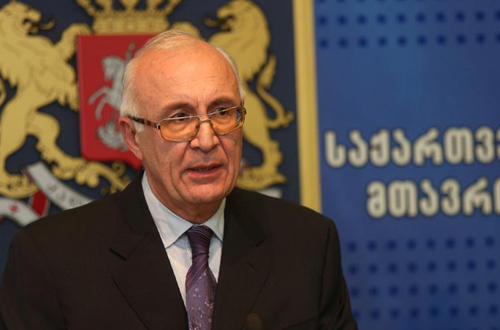
Despite Bilateral Talks, Russian Threat Still Hangs Over Georgia
Publication: Eurasia Daily Monitor Volume: 11 Issue: 77
By:

A quick glimpse could lead one to conclude that Georgian-Russian relations are truly improving. After an April 16 meeting in Prague, Czech Republic, Zurab Abashidze, the Georgian prime minister’s special representative for relations with Moscow, and Russian Deputy Foreign Minister Grigory Karasin both sounded highly optimistic about bilateral ties. They asserted that since the Georgian Dream (GD)-led government in Tbilisi launched negotiations with Russia back in December 2012, the two sides have achieved a great deal. In 2013, Russia lifted its ban on Georgian wines, mineral waters, and agricultural products. Moscow had prohibited those imports from the Russian markets in spring 2006 on health and safety grounds; but in fact, the original ban was meant to punish Georgia’s pro-Western government. Moreover, Tbilisi and Moscow currently are discussing the resumption of regular flights between the two countries, as well as the prospect of various bilateral projects in energy, transportation, science and culture. Even more so, Karasin, on his own initiative, firmly assured Abashidze that Moscow would not exert any pressure on Georgia in the run up to Tbilisi’s signing of the Association Agreement (AA) with the European Union this coming June (civil.ge, April 16).
Furthermore, on April 22, Russia released the third Georgian citizen who was serving a lengthy prison sentence for alleged espionage. Back in 2013, Georgia had itself released four Russian spies. Special Representative Abashidze asserted that the latest release of spies was not an arranged swap, but a reciprocal move by Moscow in response to Tbilisi’s show of good will when it set free its imprisoned Russian agents (kommmersant.ru, April 22).
Nevertheless, closer scrutiny quickly disperses the illusion of a new Russian-Georgian thaw. On March 6, a Russian military reconnaissance plane violated the airspace over the Georgian controlled territories of Gori district (adjacent to separatist South Ossetia) and Zugdidi district (bordering separatist Abkhazia). Moreover, on April 10, a Russian military plane once more violated the airspace, again over Zugdidi district. For the past several months, the population of this western Georgian region has regularly complained of frequent Russian overflights (radiotavisupleba.ge, April 10).
Furthermore, on April 15, Russian occupation forces in South Ossetia kidnapped and handed to the separatist authorities three Georgian TV journalists who were visiting the occupation line in the region. The Russian foreign ministry blamed them for “violating” the border. On April 16, the South Ossetian separatist government expelled the journalists from the region (TV 3 Channel, April 15, 16).
This list of incidents clearly indicates that Georgia remains vulnerable to Russia’s aggression. And these confrontations are not isolated cases; they are part of Russia’s strategy to keep Georgia under constant political and military pressure. Moreover, Russia can quickly transform these incidents into a full-blown military conflict if it decides that the time has come to bring Georgia under Moscow’s direct submission. After all, the August 2008 Russian-Georgian war followed small-scale armed skirmishes that Russia skillfully staged and then exploited to launch a military campaign against Georgia, even blaming Tbilisi for starting the war.
One may ask what else Moscow might want from Tbilisi after Russia militarily defeated and then dismembered Georgia in 2008. First and foremost, Russia needs direct land access to its close ally Armenia. In the face of the unresolved conflict between Armenia and Azerbaijan over Karabakh, Georgia remains the only route through which Russia can supply and link up with Armenia. Bringing Georgia under Russia’s direct control, either through installing a puppet government or outright occupation, is a highly desirable outcome for Moscow. Second, control over Georgia opens for Russia a direct corridor to Iran via Armenia, which may make possible various transport and trade projects that Moscow is willing to launch with Tehran (see EDM, February 7, 2013). Third, by capturing Georgia, Russia will geographically isolate Azerbaijan and subsequently, force Baku to submit to Moscow’s influence—something the Azerbaijani government is capable of avoiding so long as the Georgian link to the West is opened as planned.
The realization of any of these scenarios may seem as unrealistic as the Russian dismemberment of Ukraine seemed before Moscow annexed Crimea. Nevertheless, it did happen. Similarly, they can happen in Georgia. Much depends on the outcome of the ongoing Russian intervention in Ukraine. If Moscow succeeds there, the next step certainly can be Georgia in order to consolidate Russian gains throughout the post-Soviet space (see EDM, March 7).
In this light, current Russian-Georgian talks seem fruitless. Moscow’s lack of dedication to normalizing ties with Tbilisi is evident in the absence, to date, of any concrete steps to resolve the issue of the occupied regions: Abkhazia and South Ossetia. Russia shows no signs of easing its grip over those regions. Quite to the contrary, Moscow has actually been tightening its hold. Notably, Russia just completed erecting a barbed wire fence along the entire perimeter of occupied South Ossetia (civil.ge, April 16), thus further isolating the region from the rest of Georgia and dividing Georgian communities. Moreover, Russia continues its construction projects in Abkhazia; Vladislav Surkov, the Russian president’s aide on Abkhazia and South Ossetia, just inspected ongoing projects in Gudauta district (Regnum, April 15).
Overall, Georgian-Russian relations remain fragile as ever. Despite the illusory improvements in bilateral ties, Russia is maintaining its pressure on Georgia. Indeed, the small conflicts along the occupation zones can quickly turn into a full-blown shooting war whenever Russia sees it fit to do so—a scenario with which Georgia already has considerable experience.




